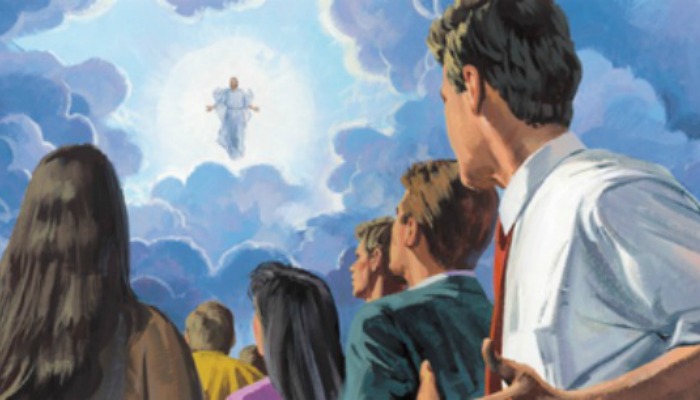“Be Not Soon Shaken in Mind, or Be Troubled”
 The letters to the Thessalonians are two of Paul’s earliest, probably written around 50 A.D. Thessaloniki is in northern Greece. Scholars think he wrote 1 and 2 Thessalonians either from Corinth or Athens.
The letters to the Thessalonians are two of Paul’s earliest, probably written around 50 A.D. Thessaloniki is in northern Greece. Scholars think he wrote 1 and 2 Thessalonians either from Corinth or Athens.
The letters to the Thessalonians are mostly personal greetings and encouragement. Paul doesn’t talk about problems with Jewish converts expecting Gentile converts to live the Laws of Moses in these letters.
Being an example of the believers (1 Thessalonians 1):
The saints in Thessaloniki were examples to saints elsewhere in Greece and Asia. They were longsuffering and charitable. They fully turned from worshipping idols to serving the living God.
The gospel is taught in a spirit of invitation (1 Thessalonians 2):
When the gospel is introduced to people there is no coercion or sales pitch involved. Rather, the gospel is introduced by the power of the Spirit and the invitation is extended to accept the gift. Paul talks about the trials of the saints in living according to their faith in a hostile environment. Only a conversion by the Spirit can make us strong enough to increase in faith in these circumstances. A good discussion could involve telling stories from missionary experiences and relating the joy a missionary feels when someone accepts the gospel.
Abound in love and joy (1 Thessalonians 3):
Paul sends greetings and reminds the Thessalonians of the amount of care and prayer their leaders invest in them, praying that they will overcome their trials and abound in love and joy. Is it possible to abound in joy in the midst of afflictions? If so, how do we do it?
Increasing in holiness (1 Thessalonians 4):
Becoming holy is a long-term project. It’s not a gift. Paul counsels the saints in Thessaloniki to avoid sexual sin (which surrounded them in their society), to be honest and clean, to be peaceful and industrious. Why are these practices conducive to increasing in holiness?
Paul then promises them that Christ will come and usher in a glorious resurrection.
Christ will come as a thief in the night (1 Thessalonians 5):
Some gospel and scripture phrases we recite without much thought. What is it like when a thief arrives in the night? It’s a surprise; we are overtaken quickly; there’s not much we can do. Paul also compares the Second Coming to the onset of childbirth. Again, it just comes upon a pregnant woman when it wants to, not when she chooses. And when it begins, it comes to fruition whether she’s ready or not. Paul says we can be in the midst of seeming peace and safety and suddenly Christ will arrive. We have to be prepared always.
Watch the following video with your group or family. It’s an ending scene from the movie (and book) Lord of the Flies. If you haven’t read it, here is a brief summary. A group of choir boys is flying to a performance when the plane crashes on an island. The adults are killed and these religiously raised boys are on their own. Most of them become little savages, worshipping a boar’s head on a stick that becomes covered with flies. They have already killed one boy, Piggy, and they are now chasing the smartest and most honorable, Ralph, in order to kill him. As Ralph runs for his life, he trips and falls at the feet of their rescuer. At that moment, salvation arrives for Ralph, but the other boys are caught dead in their tracks, spears in hand, marked with war paint. Their sins are written all over them and judgment is instant. This is great imagery of the Second Coming to discuss.
The Lord will take vengeance upon the ungodly (2 Thessalonians 1):
What happens after the scene you just witnessed in the Lord of the Flies? Ralph’s future will not be the same as the future for the other boys. Most of the boys will face some sort of punishment and a lifetime of regret. But when Christ comes, it will be too late for that, unless the guilty do some repenting in the Spirit World.
Paul praises the saints in Thessaloniki because of their patience in the face of tribulation and their willingness to endure in righteousness. In this chapter, it says about the wicked, “Who shall be punished with everlasting destruction from the presence of the Lord, and from the glory of his power…” When we return to the God who gave us life, we will know who He is and remember the love we had for Him. Separation from His influence may be the “worm that dieth not” for those who do not inherit a fulness of His glory.
Apostasy will precede the Second Coming (2 Thessalonians 2):
Early in Paul’s ministry, he taught of a falling away to come. The lesson manual for families talks about apostasy and restoration. Here is a good summary of the apostasy, the reformation, and the restoration you can share with teens and adults. And there are three videos from the Church at the bottom of this article.
Satan will be able to do his work until Christ comes, reveals him, and defeats him “by the brightness of His coming.” The fire that will destroy the wicked is the glory of Christ, which they cannot bear.
Be not weary in well-doing (2 Thessalonians 3):
Paul has heard that some are idle and expect to be supported by others. He admonishes them to work for their bread. He also admonishes the saints to separate themselves from members who are not living according to their covenants but to correct them as brothers, not as enemies.
Lesson Resources:
churchofjesuschrist.org — Come Follow Me



